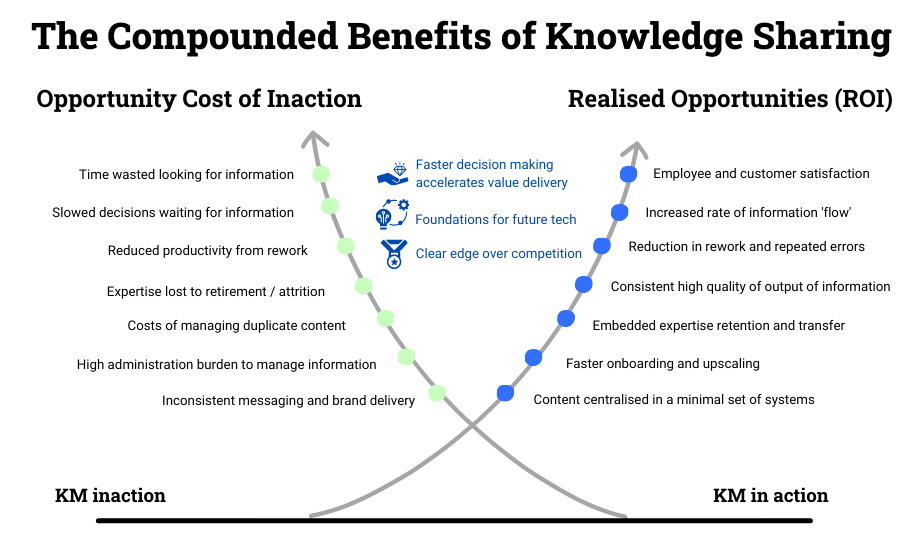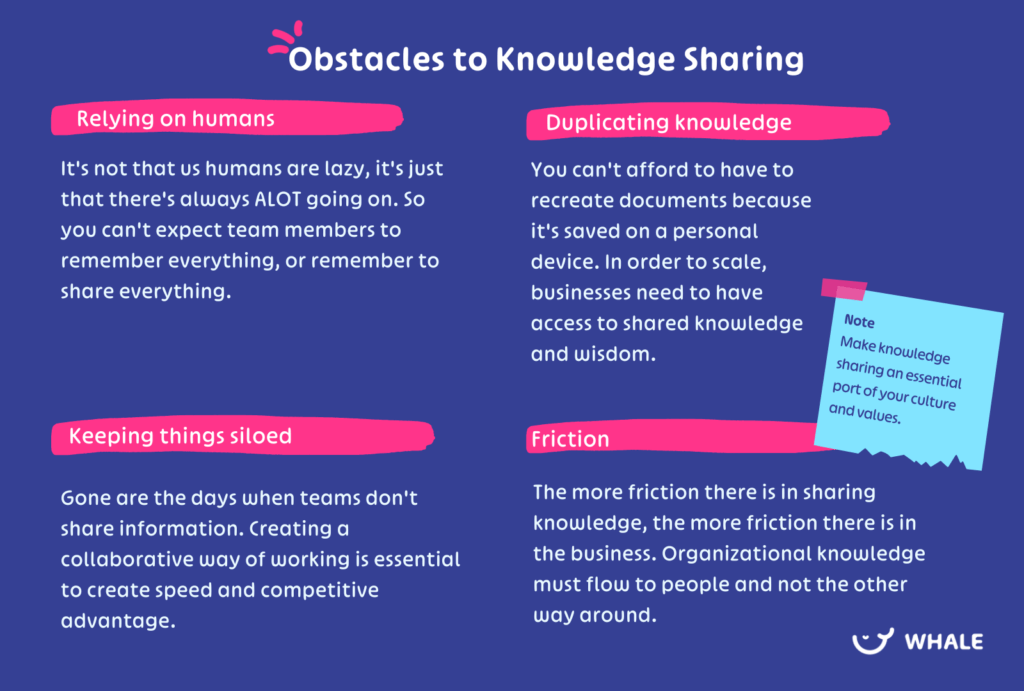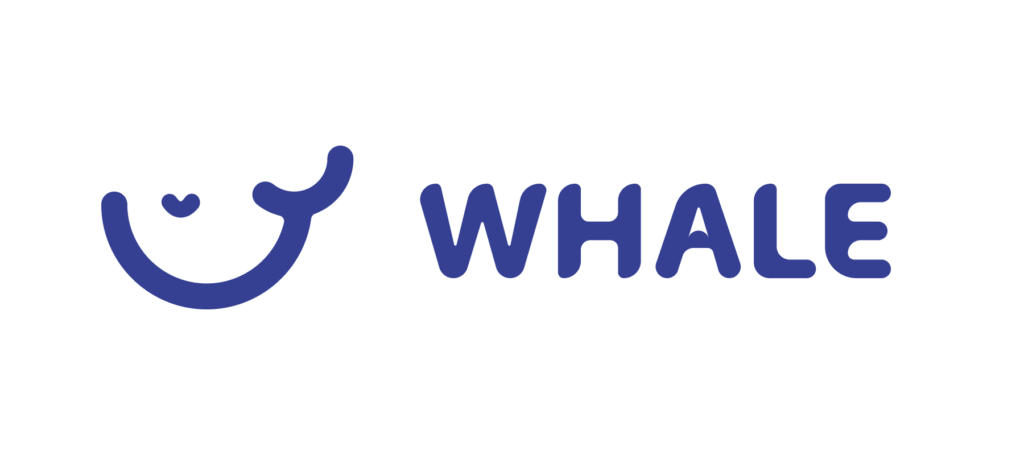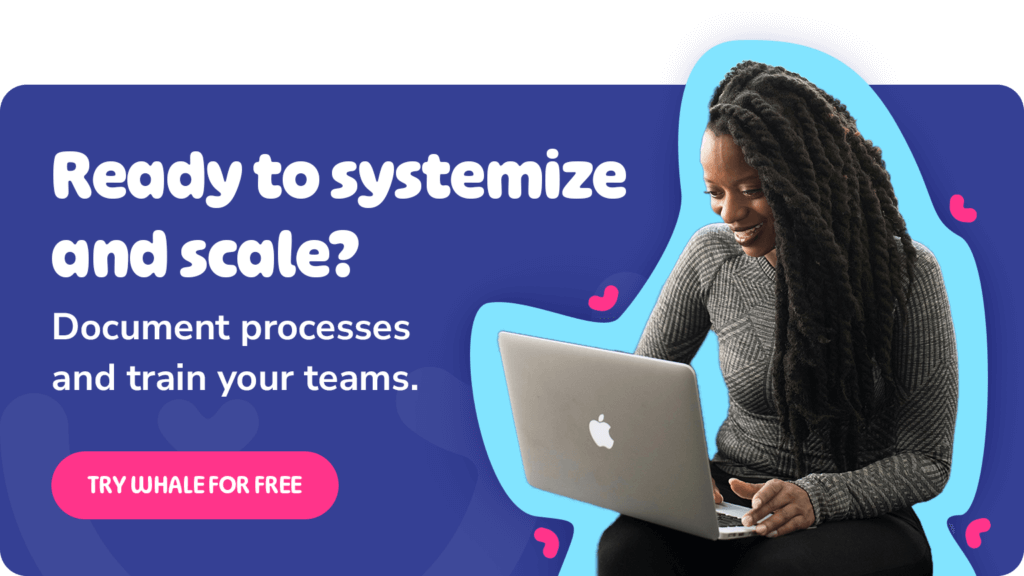Knowledge Sharing isn’t just about Standard Operating Procedures and processes; it’s a significant contributor to growth in a business and an opportunity to scale business, mitigate business risk and promote engagement.
What is knowledge management versus knowledge sharing?
The search for Knowledge Management (KM) Yields 2,840,000,000 results on Google, with the Oxford Dictionary defining KM as "Efficient handling on information and resources with a commercial organization.
Knowledge Sharing is more broadly defined as the exchange of information and know-how to help others and to collaborate with others to solve problems, develop new ideas, or implement policies or procedures.
“How do you manage knowledge in an effective, sustainable way? Start by thinking of it as knowledge sharing, not knowledge management.”
CIO Magazine Tweet
Whilst the difference between the two terms may seem like mere semantics, the impact on business is stark.
Unless what we deem to be the golden key to scaling; knowledge, can be shared in the moment of need where needed, it acts as friction to employee experience, customer experience, collaboration, and growth.
What does not sharing knowledge cost?
What was once thought the challenge for VPs of People is increasingly being considered a business-critical challenge. Inefficient Knowledge Sharing Costs Large Businesses $47 Million Per Year according to the Panopto Workplace Knowledge and Productivity Report. Considering that the report was published pre-Covid, that number could be radically higher in today’s terms.

Calculate your ROI
When you’re choosing a documentation & training solution for your team, you want to know what return you can expect.
Equally concerning is that employees spend around 26 days each year searching for information, which is valuable time that could be undoubtedly better invested (Critical Knowledge Transfer Book).
Knowledge Management technology has typically been viewed as a “privilege” for enterprise-sized organizations that could afford the product and the implementation and people support needed to ensure uptake.
These days increasing attention is being given to Knowledge Management and Sharing tools for entrepreneurs and organizations looking to scale across a number of industries.

Does knowledge sharing still matter in 2024?
Absolutely, knowledge sharing is essential for businesses in 2024, especially for entrepreneurs aiming to scale efficiently and innovate rapidly!
It’s not just about pooling collective intelligence; it’s a strategic asset that drives competitive advantage, speeds up problem-solving, and mitigates risks associated with knowledge loss.
Effective knowledge sharing translates into faster, insight-driven decision-making and reduced redundancy, enabling your team to operate with a high degree of efficiency and agility.
By fostering a culture where information is freely exchanged, you not only enhance your team’s capabilities but also boost morale and innovation across the board. This is how modern businesses build resilience and stay ahead in fast-evolving markets
Why knowledge sharing matters in a startup
Managing knowledge in a startup or a small business is more spontaneous, unstructured, and tribal by nature. Ideas happen fast and are run with just as quickly! Who’s got time to document things right? Besides, it isn’t really a necessity, right?
Wrong.
An unstructured way of working when there are three team members all working together from one location is one thing but what happens when the business starts to scale?
Just use email? ❌
In our experience that doesn’t work well either. Check out why we banned email at Whale and saved hundreds of hours a month. In short, internal email creates friction, steals time, and can often result in different versions of saved knowledge.
Time is Money Growth. If you begin to think of time as the most valuable asset in your business’ growth, Knowledge Sharing begins to make a lot of sense, or should we say dollars and cents? The less time you have to spend explaining to someone how to do something is more time you’ll have available to develop strategy, connect with customers and partners or refine your product.
If everyone is taking the same approach to working with customers or resolving challenges not only are you creating operating efficiency but you’re also creating brand consistency; an all valuable asset in scaling.
Why does traditional knowledge sharing fail?
The challenge with mediums of traditional Knowledge Sharing including calls, emails, meetings, water cooler speak, and even good old knowledge repositories are that they result in inconsistent and duplicated knowledge.
The problem with traditional knowledhe sharing is that;
- it is open to misinterpretation,
- keep organizations working siloed instead of cross-functionally
- and place immense strain on people, particularly those leading teams to be a teacher and ‘do-er’ when they should be focused on pioneering growth.

It’s no wonder thousands of founders and entrepreneurs have embraced Knowledge Sharing tools in recent years but often even these tools have consistently failed because they’ve neglected to utilize human first design principles.
The Trouble with “Users” is They’re Only Human and unless tools have been designed to bring company knowledge to the human, then what you have is a very expensive tool that won’t be adopted as a way of working.
The biggest obstacle to the way your company shares information is friction
The world’s best teams use technology. But they use technology that enhances the way they work.
Human behavior is like water and we humans always take the path of least resistance. We are more likely to tap someone on the shoulder than we would walk to a folder on a shelf to find information, even if the shelf is virtual, and we don’t have to walk anywhere at all.
Understanding this has been one of our founding principles.
Knowledge must flow to people and not the other way around.
Knowledge Storage ISN’T Knowledge Sharing
The biggest difference between a true Knowledge Sharing tool like Whale and other solutions like Google Drive is the only thing these other systems really offer is a repository for your SOPs, policies, and training manuals.
The reason why we are seeing a lot of customers move from these tools to Whale is for the same reason that storing your documents in a drive doesn’t work. It’s yet another silo in which your content sits and where you expect your teams to take the time to go to and find what they need (Which most of them won’t do).
If there’s friction in having to adopt a process or tool, it won’t be adopted.
6 Key trends for the future of knowledge sharing
We first wrote this article in August 2022 when ChatGTP and other advanced AI platforms weren’t even a thing.
Fast forward to 2024 and information is accessible faster than ever. But more important that pure information is harnessing knowledge and translating it into company wisdom.
We consider the input of the 6 experts in knowledge sharing and the current landscape of AI.
Let’s go into some of the trends will continue to influence Knowledge Sharing in 2024 and beyond?
1. 💡 Content Matters for Knowledge Engagement
No one has time. Including your team members so you have to make consuming content easy!
The rate of engagement increases dramatically depending on how content is structured. We often apply this in our efforts as organizations when sharing content with external partners and customers but tend to neglect this when creating content for internal customers.
🌟 TOP TIP: Use video and graphics to promote knowledge engagement.
Bottom line is that content is more likely to be consumed when structured well and is interesting.
2. 💡 Design for Humans
The fundamental flaw in most legacy systems is that they put the technology first and the human second.
Designing for humans first becomes a key factor when considering what tools to adopt in your business. One of the reasons tools like Slack are so successful is that they’re designed for the natural flow of human interaction and communication.
🌟 TOP TIP: Integrate your tools into the apps where your team works, to make accessing company information seamless. For example, the Whale Chrome extension brings information to your team when and where they need it.
3.💡 Affordable technology enables access
Knowledge Sharing is no longer for the few or for large enterprises. Technologies such as AI and intelligent enterprise have become increasingly accessible and affordable. This means that adopting a technology stack as a growing organization is not only possible but will fast track scaling.
Gone are the days of siloed working. Enterprise information should be at hand when and where needed for all members of the organization. Need to know your leave policy or general information on your company or what your customer escalation process is? These should be available to all team members at all times when needed.
🌟 TOP TIP: Get technology that enables everyone in your team to get aligned faster.
4. 💡 Knowledge as a Strategic Asset and Competitive Advantage
An organization’s success is highly influenced by how efficiently it can tap into its resources of data and knowledge. One way to think about it is to imagine you could clone your CEO and have him sit beside your team while they onboard new customers or have your CTO on hand to oversee your engineering team’s product updates? Now you can.
🌟 TOP TIP: Make sure you integrate knowledge transfer in your business to facilitate faster onboarding and training, and ultimately business growth.
5. 💡 It doesn't have to take time
You can start documenting from scratch in no time!
Thanks to AI, gone are the days when documenting company information and sharing it with team members takes time.
These days with tools like Whale, you can
- Use AI to create SOPs in seconds
- Start with a template
- Get a consultant to help you document
🌟 TOP TIP: Check out the templates on Whale.
6.💡 Frictionless User Experience to combat high cognitive load
"Cognitive load" relates to the amount of information that a person can hold at one time.
Cognitive load is impacted by stress, which means that if someone is under stress like most of us are in 2024, they are less likely to have the mental resources to go and look for information.
Enterprise Knowledge should be shared seamlessly and integrated into working apps where team members need to access information, placing less stress on the user and enabling higher engagement.
🌟 TOP TIP: Try Whale for free, and get started in seconds!
The challenge of knowledge sharing
Okay, so you’re convinced of the benefits of Knowledge Sharing and want to get started with the right tool?
Yes, undoubtedly, process documentation software is going to help you resolve a bunch of challenges, but…
Hang ten, it’s important to choose the right tool and to understand you’re going to face two main challenges.
Knowledge needs to be documented
As CEO or team leader, you’re going to have to get the content out of your head or Google Drive or local storage device in order to be centralized to enable sharing. This might sound like a lot of work but in the long term, it’s a lot less work than having to do the same task over and over at the opportunity cost of growing your business.
This is also why, at Whale, we work with content experts to migrate and create content onto the platform. This brings us to the second and most important challenge when adopting a Knowledge Sharing Tool.
Mindset shift
As humans, we are inclined to approach tasks in the same manner and mindset but tasks need to be broken down and categorized differently. Some tasks are menial and others are investments.
For example, you may think it’s quicker to pick up the phone and contact your on-the-ground salesperson in one location to resolve a particular challenge. But what if you have to do this with five different salespeople in five different locations? It may be easier to create a video once and put it into your Knowledge Sharing tool and automate the knowledge flow.
Creating a video if you’ve never done it before might seem like more work but that’s simply because it’s out of your ordinary task agenda. Actually once done, it’s done for a long period of time.
In this way, such a task is an investment in your growth. As you begin to think about tasks from a strategic perspective, you’ll begin to and want to systemize processes more
If you can master mindset, changing habits will be easy and ultimately form part of your culture.
How to choose the right Knowledge Sharing Tool?
We designed Whale specifically for scaling organizations because we built key features into our solution to enable small and medium enterprises to scale fast.
Regardless of your size however there are key functionality considerations and features that should be part of the consideration process when choosing a Knowledge Sharing tool.
We highlighted some of the key features to consider;
- Is it easy to document and create content on the platform?
- Is it easy to onboard and train team members?
- Does it have an option to help you migrate content?
- Does it integrate into your working apps?
- Does it have a mobile app on IoS and Android?
- Does it feature a Rich Media Editor?
- Are there templates to get you started?
- Does it feature an image & GIF library?
- Can you integrate video?
- Does it provide reporting?
- Does it have QR Code capability?
- Is it cloud and/or app-based?
- Does it feature an intuitive structure and interface?
- Can you allocate team members to oversee certain knowledge?
- Does it have social proof and reviews from other companies?
FAQs about knowledge sharing
What are examples of knowledge sharing?
Knowledge sharing in the workplace can take various forms, integrating techniques that enhance collaboration across generations and embrace a global perspective. Here are 3 examples that highlight different approaches to knowledge sharing:
Multilingual Knowledge Base: Creating a centralized knowledge repository that supports multiple languages, ensuring that employees across different regions can access and contribute to the pool of information.
Virtual Cross-Cultural Teams: Forming project teams that span multiple countries to encourage the sharing of diverse perspectives. These teams can work on global projects and leverage virtual meeting tools to discuss, plan, and execute tasks, ensuring that insights from various cultural backgrounds are integrated into decision-making processes.
Innovation Challenges: Hosting company-wide innovation challenges where employees from all departments submit proposals for new products, services, or process improvements. This not only promotes a culture of innovation but also encourages the sharing of diverse ideas and approaches that can be applied across the company.
What hinders knowledge sharing in the workplace?
Several factors can hinder knowledge sharing at work, impacting the overall efficiency and potential of a business:
-
Cultural Resistance: If a company culture does not actively encourage sharing, information hoarding becomes the norm, severely crippling innovation and growth.
-
Trust Deficits: Without mutual trust, employees hesitate to share valuable insights, fearing misuse or underappreciation of their contributions.
-
Inadequate Technology: Lack of tools for easy access and dissemination of information creates significant barriers to effective knowledge sharing.
-
Organizational Silos: Isolated departments lead to duplicated efforts and missed collaborative opportunities, stalling organizational efficiency.
-
Time Constraints: In high-pressure environments where employees are constantly under time constraints, they may feel they do not have the time to share or document their knowledge effectively. This can lead to significant gaps in organizational knowledge. (The irony is that the less knowledge is sharing, the longer it takes to complete a task!).
-
Lack of Incentives: Without proper incentives or recognition, employees might not feel motivated to share their knowledge. Recognition can be a powerful motivator for employees to contribute their insights and experiences.
How can I encourage my colleagues to share knowledge?
To foster a culture of knowledge sharing in your startup, you must lead with a vision that champions open communication and collective growth. Here’s how you can inspire and encourage your team to actively participate in knowledge sharing:
-
Establish your values: Communicate the critical role that knowledge sharing plays in your startup’s success. Highlight how it can accelerate problem-solving, drive innovation, and enhance team cohesion. Make it clear that sharing knowledge is not just beneficial but a vital part of your company’s ethos.
-
Create the Right Infrastructure: Implement tools and platforms that facilitate easy sharing of information.
-
Recognize and Reward Sharing: Set up recognition programs that reward those who actively share their expertise and contribute to others’ learning.
-
Lead by Example: As a leader, actively participate in knowledge sharing sessions. Share your own insights and learnings. When leadership is seen valuing and practicing knowledge sharing, it sets a powerful example for all team members.
-
Create Space for Learning: Regularly schedule times for employees to share insights, learn from others, and even bring in external experts. The key is to integrate learning into the culture, not as an afterthought.
Bottom line?
By fostering an environment where knowledge flows freely, businesses not only accelerate their growth but also build resilient foundations that can adapt to future challenges.
As we look beyond 2024, it is clear that the future belongs to those organizations that recognize knowledge sharing not just as a strategy but as the cornerstone of a thriving, innovative culture. Let’s embrace this future with open minds and collaborative spirits, ensuring that knowledge is not just stored but shared, celebrated, and continually enhanced.







